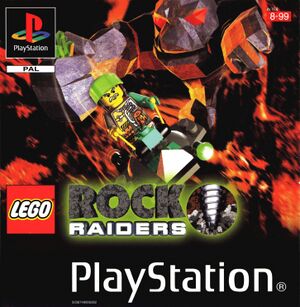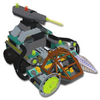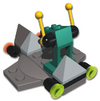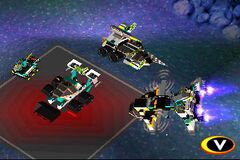LEGO Rock Raiders (PlayStation video game)
| LEGO Rock Raiders | |
|---|---|
 European front cover | |
| Developer(s) |
|
| Publisher(s) | LEGO Media International |
| Producer(s) |
|
| Programmer(s) |
|
| Artist(s) |
|
| Platform(s) | PlayStation |
| Release | |
| Genre(s) | Action, strategy |
| Mode(s) | Single-player, multiplayer |
LEGO Rock Raiders is a 1999 action and strategy game developed by Data Design Interactive and published by LEGO Media International for PlayStation. The game is based on and was developed alongside the LEGO theme of the same name. Like the Windows version of LEGO Rock Raiders, it features a team of space explorers mining for energy crystals on a hostile alien planet. Rather than managing a team of Rock Raiders, however, the player directly controls one character in each level, traversing challenges using their chosen character's skills and any vehicles they find.
Initially conceived as a strategy game akin to its Windows counterpart, development on the PlayStation version of Rock Raiders started over in early 1999 at the behest of LEGO Media International. Developers were given only six months to complete the new version of the game, which eventually became an action game similar to Blast Corps. It released in Europe in December 1999, shortly after the Windows version did; however, the game was initially rejected by Sony's North American branch. The North American version went through a further period of development, receiving many adjustments and a new set of levels by GameWorld 7, before eventually releasing in August 2000. Though the game was reworked due to concerns that strategy games would not be successful on PlayStation, it ended up receiving mixed reviews.
Gameplay

Write about Mark's incredible gameplay here![3]
Characters
Write the differences between the characters
Vehicles
(images are temporary until I can try scanning my manual)
| Header text | Header text |
|---|---|
 Chrome Crusher |
The Chrome Crusher is a large mining vehicle with both a drill and a laser. It can drill through all rock types quickly. If the player has Laser Beam PowerCells, its laser can destroy walls and Rock Monsters in a single shot. If driven by Axle, this vehicle will travel faster. The Tunnel Transport can carry this vehicle. |
 Hover Scout |
The Hover Scout is a small hovering vehicle that can travel over land quickly, though it is hard to control. |
 Large Mobile Laser Cutter |
The Small Mobile Laser Cutter is a large, slow-moving mining vehicle with a laser. If the player has Laser Beam PowerCells, its laser can destroy walls and Rock Monsters in a single shot. If driven by Axle, this vehicle will travel faster. |
 Loader Dozer |
The Loader Dozer has a large front-mounted bucket that can be used to clear away spider webs. If driven into Dirt or Loose Rock walls fast enough, it will smash through them instantly. It is also immune to damage from geysers and lava plumes. If driven by Axle, this vehicle will travel faster. |
 Rapid Rider |
The Rapid Rider is a water-bound vehicle that can swiftly traverse underground lakes and rivers. If sailed by Bandit, this vehicle will travel faster. |
 Small Digger |
The Small Digger is a small drilling vehicle. It can drill through Dirt and Loose Rock faster than a Rock Raider; it cannot drill through Hard Rock. If driven by Axle, this vehicle will travel faster. The Tunnel Transport can carry this vehicle. |
 Small Mobile Laser Cutter |
The Small Mobile Laser Cutter is a small mining vehicle with a laser. If the player has Laser Beam PowerCells, its laser can destroy walls and Rock Monsters in a single shot. If driven by Axle, this vehicle will travel faster. |
 Tunnel Scout |
The Tunnel Scout is a small flying vehicle that can travel over land, water, or lava. It flies high enough that creatures cannot attack it, though it can still take damage from geysers and lava plumes. If piloted by Jet, this vehicle will travel faster. |
| File:PS UK manual Tunnel Transport.png Tunnel Transport |
The Tunnel Transport is a large flying vehicle that can pick up certain other units. It can fly over any surface type and even travel over rock walls if it is not carrying anything. It is only able to land on landing pads, including those at Teleport Stations. It flies high enough that creatures cannot attack it, though it can still take damage from geysers and lava plumes, and carried units can be damaged by creatures or by being slammed into walls. It can pick up Rock Raiders, the Small Digger, the Chrome Crusher, and the scoop. While in the air, pressing X over any of these units will pick it up; the latter three can be dropped by pressing X again. Scoops can be dropped into water to fill them, then water-filled scoops can be dropped by lava to turn it into ground. If piloted by Jet, this vehicle will travel faster. |
Alien lifeforms
Maybe also hazards in general
| Header text | Header text |
|---|---|
| Spider | I hate you |
| Scorpion | One is annoying, one is deadly |
| Slimy Slug | Battering ram |
| Rock Monster | Comes in three tasty flavours! |
| Rock Whale | big boy |
Other stuff like geysers and webs.
Missions
In total, the two versions of the game have fifty unique missions between them, and sixty-three total missions, listed below:
| Europe (PAL) | North America (NTSC-U/C) | |||
|---|---|---|---|---|
| Level | One-player | Two-player | One-player | Two-player |
| 1 | ||||
| 2 | –
| |||
| 3 | –
| |||
| 4 | –
|
–
|
–
| |
Development
Like its Windows counterpart, the PlayStation version of LEGO Rock Raiders was developed by the Halesowen-based video game developer Data Design Interactive. Work on it began in July 1998, following the Windows version's development that started in October 1997.[4]: 2
...my dreams of Nintendo-like quality were sort of shattered when the MD, who was, well... My personal opinion was that he knew nothing about game development. I had to explain to him the difference between a 3D character and a sprite once. You know when you think, "I have to explain this?"
David Upchurch[5]
The PlayStation version of LEGO Rock Raiders was initially intended to be a real-time strategy like the Windows version. In February 1999, however, LEGO Media's worldwide managing director Mark Livingstone decided that real-time strategy games did not work on the PlayStation, following the commercial failure of a Command & Conquer title on the system.[5][6] Despite having only six months before the game was due to be submitted to Sony Computer Entertainment, the developers were ordered to rework it into an action game.[7] Tomas Gillo, the project's senior producer,[8] insisted he did not have time to rework the PlayStation game while finishing work on the Windows version, so David Upchurch was made the PlayStation version's producer in March 1999.[7] Upchurch had previously worked for LEGO Media as a producer for LEGO Chess and early versions of what would eventually become LEGO Island 2,[9][10] and had visited Data Design to playtest the Windows version of Rock Raiders several times.[11]: 10

After many strategy-focused elements were removed from the PlayStation game, the developers were left with a 3D engine that could render deformable terrain, some LEGO vehicle models, and small minifigure sprites. Upchurch enjoyed controlling the vehicles and drilling through walls, and suggested making the game play like a hybrid between Gauntlet and Blast Corps. The player would be given missions they could complete either on-foot or using a variety vehicles, each with different attributes, and could collect LEGO bricks to construct new vehicles.[7]
...every night I'd retire to my hotel room, exhausted, thinking to myself "That was a good day, we made good progress... but the game’s still going to crap." All in all, it was a depressing and demoralising experience that soured my attitude towards working at LEGO Media.
David Upchurch[7]
As the game's submission date approached, Upchurch spent nearly two months living in Birmingham while he worked on it with Data Design Interactive, designing levels and playtesting it. After finishing work on LEGO Rock Raiders in August 1999, Upchurch left LEGO Media, going on to launch the magazine PlayStation World for Computec Media in 2000.[7][12] Upchurch later wrote about his experience on his website, where he described his assignment as being handed "the poison chalice" and cited his negative experience producing Rock Raiders as a major reason for leaving LEGO Media. He also hypothesised that Livingstone's desire to drastically change the game was due to poor sales of Command & Conquer on PlayStation.[7]
Although Sony Computer Entertainment Europe signed off on LEGO Rock Raiders, Sony Computer Entertainment America rejected it, stating that further fixes were required before it could be released.[13][a] The North American version received a further three or four months of development; LEGO Media and Data Design took this opportunity to further adjust the game's gameplay and levels. GameWorld 7 was hired to create an entirely new set of levels to replace Data Design's.[13][14]
Release
LEGO Rock Raiders for PlayStation was released in Europe on 10 December 1999.[2]
LEGO Media announced that LEGO Rock Raiders for PlayStation had shipped in North America on August 15, 2000. Its suggested retail price was initially US$19.95. LEGO Media's global director Mark Livingstone stated enthusiasm for the game's success, citing the reception that LEGO Racers received on PlayStation.[15] Rock Raiders was officially available at retail two days later on August 17.[1]
Reception
| Aggregator | Score |
|---|---|
| GameRankings | 59%[16] |
| Publication | Score |
|---|---|
| AllGame | |
| The Electric Playground | 3.5/10[18] |
| GameSpot | 3.2/10[19] |
| IGN | 6/10[20] |
| Official Australian PlayStation Magazine | 4/10[21] |
| Official U.S. PlayStation Magazine | 1/5[22] |
LEGO Rock Raiders received mixed reviews on PlayStation according to the review aggregation website GameRankings.[16]
Notes
- ↑ Upchurch stated in the source that SCEA accepted it and SCEE rejected it, leading to the European version being delayed. However, the latest dates on each version's files (1 September 1999 for the European version, 12 February 2000 for the North American version) indicate that he mixed them up, and the American version was delayed. The August 2000 release date in North America further supports this.
References
- ↑ a b Zdyrko, Dave (August 4, 2000). "New screens of Lego Media's venture into strategic mining action -- mining has never been this fun!". IGN PSX. Snowball.com. Archived from the original on August 15, 2000.
- ↑ a b "Lego Rock Raiders for PlayStation". Chipsworld. Archived from the original on 26 April 2001. Retrieved 7 June 2024.
- ↑ Fielder, Lauren (April 28, 1999). "Lego Rock Raiders Preview [last updated March 21, 2000]". videogames.com. ZDNet. Archived from the original on 16 August 2000. Retrieved 3 June 2024. Proper date sourced from GameSpot mirror.
- ↑ Schwelling, Amy (17 May 1999). "LEGO Rock Raiders "Behind the Scenes..." for the LEGO World Club Magazine" (memo). LEGO Media. Retrieved 1 September 2023.
- ↑ a b Monaghan, Paul (21 January 2019). "Episode 83: Dave Upchurch Interview". Maximum Power Up (Podcast). Libsyn. Event occurs at 2:23:36–2:35:00. Archived from the original on 31 May 2024. Retrieved 31 May 2024.
- ↑ Data Design Interactive (November 1999). LEGO Rock Raiders (PlayStation) (PAL ed.). LEGO Media International. Scene: Credits.
Worldwide Managing Director: Mark Livingstone
- ↑ a b c d e f Upchurch, David (2012). "LEGO Rock Raiders (PS1)". DUpchurch.com. Archived from the original on 18 January 2019.
{{cite web}}: CS1 maint: unfit URL (link) - ↑ Data Design Interactive (November 1999). LEGO Rock Raiders (PlayStation) (PAL ed.). LEGO Media International. Scene: Credits.
Senior Producer: Tomas Gillo — Producer: David Upchurch
- ↑ Upchurch, David (2012). "LEGO Chess (PC)". DUpchurch.com. Archived from the original on 21 August 2018.
{{cite web}}: CS1 maint: unfit URL (link) - ↑ Upchurch, David (2012). "LEGO Island 2 (Various)". DUpchurch.com. Archived from the original on 21 August 2018.
{{cite web}}: CS1 maint: unfit URL (link) - ↑ Crecente, Brian; Vincent, Ethan (14 July 2021). "Episode 28 – The Fans, Devs, and Remake of RTS Classic LEGO Rock Raiders" (PDF). Bits N' Bricks (Podcast). Participants: Simon Eriksson, Ferdinand Köstler, Alan Sokol, and Karl White. The LEGO Group. Archived (PDF) from the original on 19 January 2023. Retrieved 30 May 2024. Audio version via YouTube.
- ↑ Upchurch, David (2012). "PSW: Playstation World". DUpchurch.com. Archived from the original on 21 August 2018.
{{cite web}}: CS1 maint: unfit URL (link) - ↑ a b jamesster (17 February 2013). "I had an email conversation with Dave back in December, he's a really nice guy and had lots of cool stuff to share". Rock Raiders United (comment on forum topic "LEGO Interactive producer located"). Archived from the original on 7 October 2015.
- ↑ Data Design Interactive (August 15, 2000). LEGO Rock Raiders (PlayStation) (NTSC-U/C ed.). LEGO Media International. Scene: Credits.
LEVEL DESIGN – Gameworld Seven Ltd – [email protected]
- ↑ Gamespot Staff (August 15, 2000). "Lego Rock Riders Ship". GameSpot. CNET Networks, Inc. Archived from the original on 4 October 2003. Retrieved 30 May 2024.
- ↑ a b "LEGO Rock Raiders for PlayStation". GameRankings. CBS Interactive. Archived from the original on 1 May 2019. Retrieved 1 September 2023.
- ↑ Green, Earl (August 2000). "LEGO Rock Raiders (PS) - Review". All Game Guide. AEC One Stop Group, Inc. Archived from the original on 17 November 2014. Retrieved 30 May 2024.
- ↑ Ashe, Suzanne (August 30, 2000). "LEGO Rock Raiders (PS)". The Electric Playground. Elecplay.com Productions, Inc. Archived from the original on 14 November 2003.
{{cite web}}: CS1 maint: unfit URL (link) - ↑ Satterfield, Shane (August 24, 2000). "Lego Rock Raiders Review for PlayStation". GameSpot. CNET Networks, Inc. Archived from the original on 26 June 2003. Retrieved 30 May 2024.
- ↑ Cleveland, Adam (August 16, 2000). "Who knew playing with Lego's on your PlayStation could be fun? We sure were surprised". IGN PSX. Snowball.com. Archived from the original on 15 December 2000. Retrieved 30 May 2024.
- ↑ Soropos, George (January 2000). "Lego Rockraiders". Official Australian PlayStation Magazine. No. 30. Sydney: APC Publishing. p. 72.
- ↑ Steinman, Gary (October 2000). "Reviews: Lego Rock Raiders". Official U.S. PlayStation Magazine. No. 37. Oak Brook: Ziff Davis Media. p. 133.
<ref> tag with name "manual E" defined in <references> is not used in prior text.
